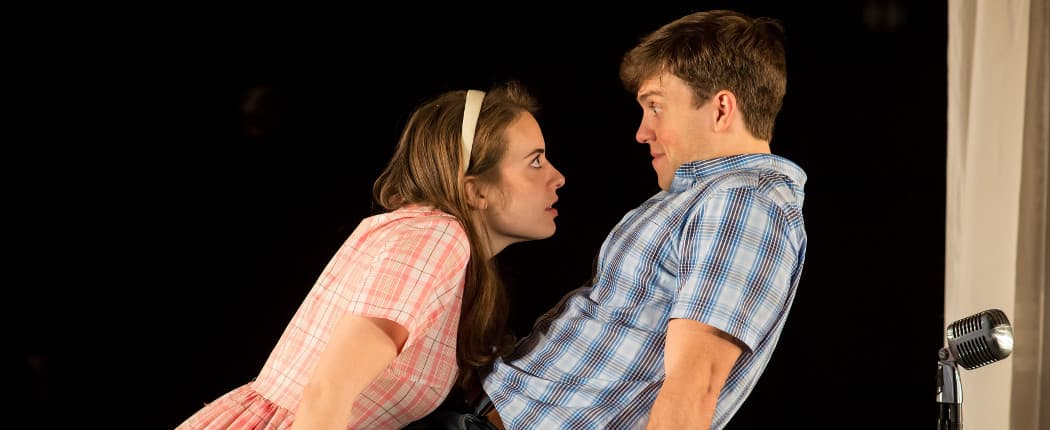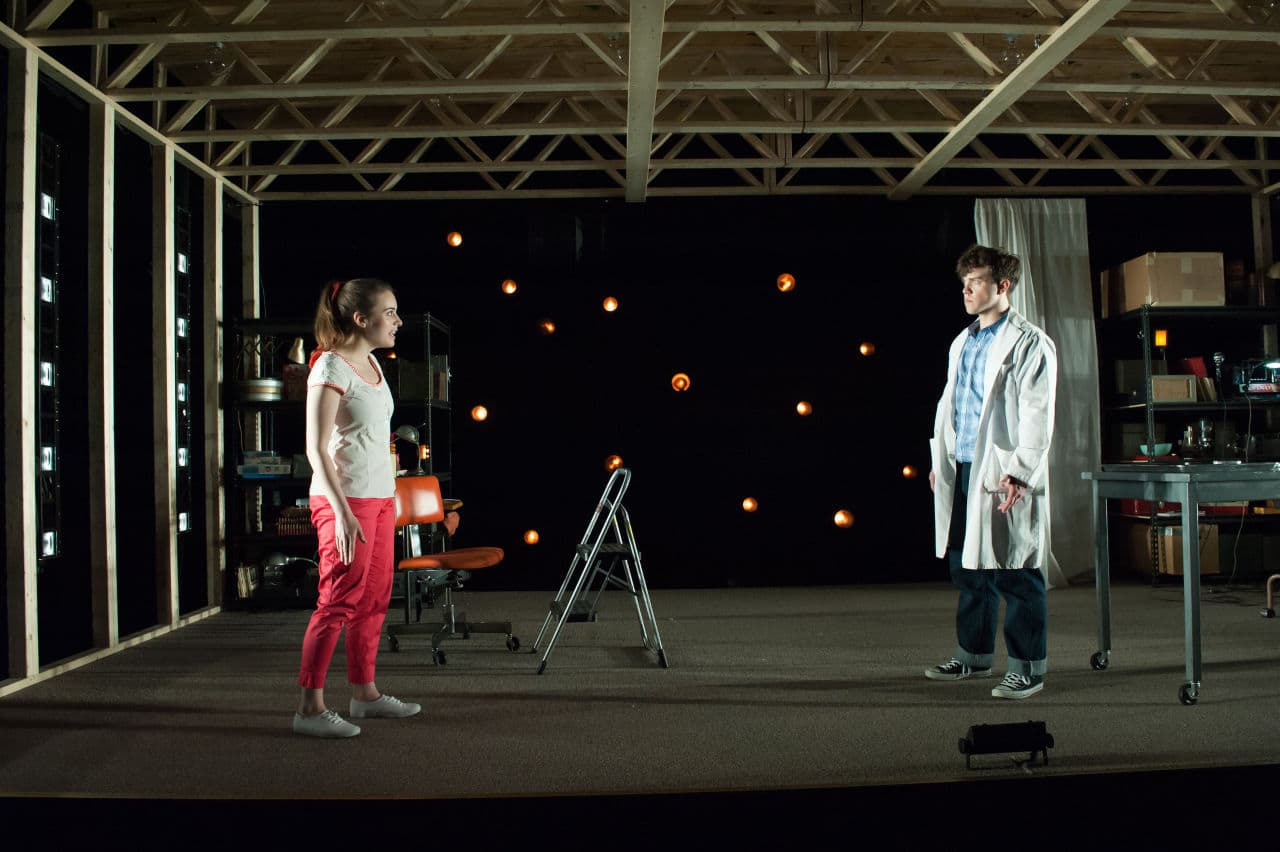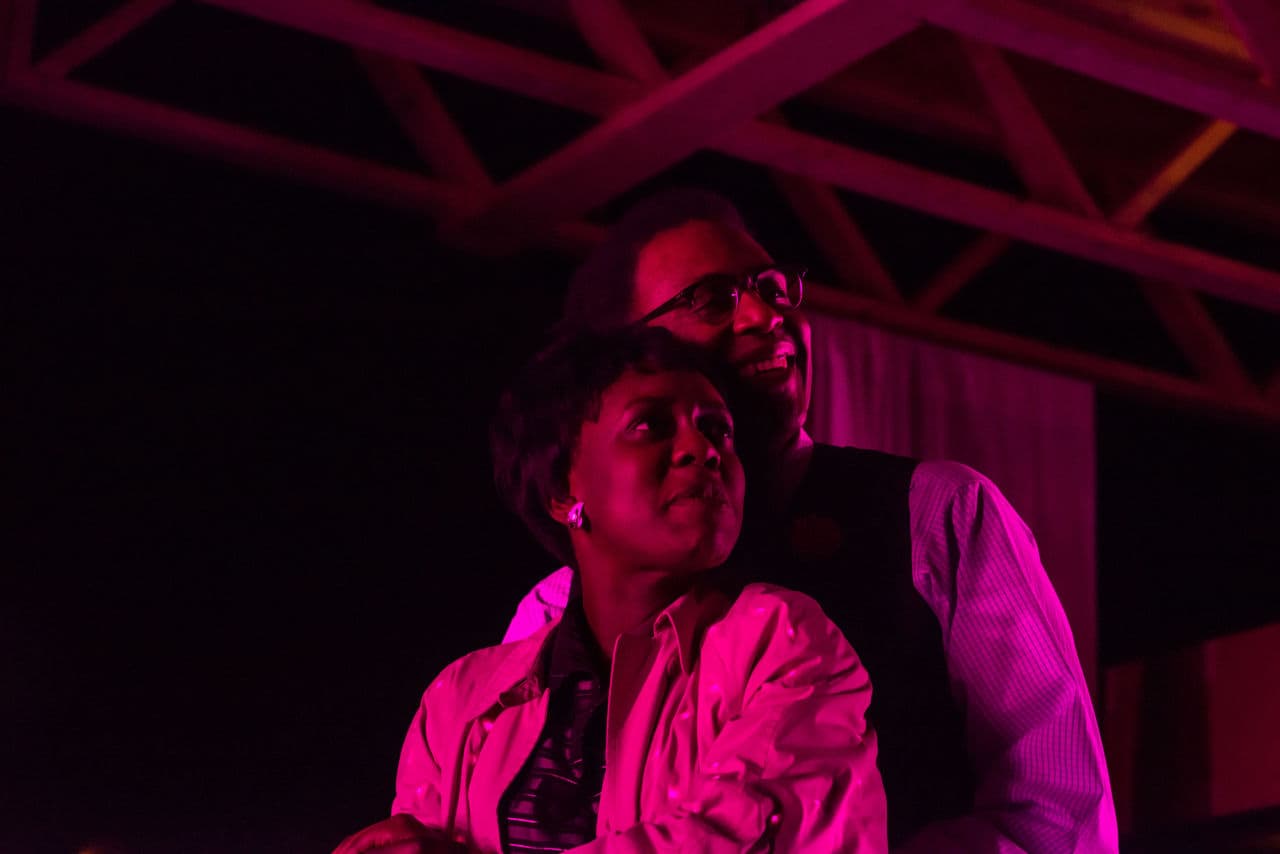Advertisement
'Mr G' Gives Us The Universe, But Leaves Out Too Much Of Everything Else

“Mr g,” the play based on a 2012 novel by Alan Lightman now enjoying its world premiere at Central Square Theater, would make for a pretty interesting physics class. As theater, however, it falls short.
The play, presented by Underground Railway Theater, tells the story of how a great void evolved to become, well, us and this universe we call home. This epic evolution is detailed throughout by the titular Mr g, who dresses like a kid at the mall and lives in what appears to be an attic, but who is in fact the Supreme Being.
More scientific of mind than the Biblical Creator, Mr g wakes from a nap, gets bored and decides to occupy himself with the creation of a universe. The result, which he refers to as 104729, grows according to the principles he’s laid out. Eventually, matter develops, and when some of this matter starts moving about and thinking and feeling, things naturally get complicated.
Helping Mr g find his way through the murkier aspects of universe building are his aunt and uncle, Penelope and Deva, who come and go throughout. Lightman’s book, formally titled “Mr g: A Novel about the Creation,” also features a dark character called Belhor who asks pesky questions about the fates, fears and sufferings of those creatures populating this new universe. Onstage, we get instead The Neighbor Girl, who is more flirty and sweet than her novelistic counterpart, but who still manages to bring to the surface the same kind of troubling issues at several points during the two-hour running time of “Mr g.”

The result of all this plays like a mash-up of quantum physics and Genesis, with sprinkles of Nietzsche, Bergson and Sartre tossed in. Sounds like there could be the makings of some fun, heady stuff. However, too often “Mr g” feels as if the script had been replaced by a textbook. Instead of conflict — the lifeblood of any conventional stage production — we get a dissertation full of phrases only Bill Nye the Science Guy could love, like “torpor of potentiality."
Perhaps the trouble can be found, to quote an appropriate phrase, in the beginning. The main problem with “Mr g” stems from the choice of source material. In a novel, the Big Bang and its billions of years of fallout can unfold on the limitless canvas that is the reader’s imagination. Trying to stage it in a space the size of my dining room with four flesh-and-blood characters and meager effects requires so much scientific explanation that the life is drained from the production. And let’s face it, anyone who’s made it to high school already knows the plot. This is the kind of complex, erudite material Tom Stoppard specializes in, but even his attempts sometimes fall short.
Act 1 is especially problematic. Jordan Ahnquist as Mr g is forced to use an old-fashioned microphone, vocal tics, excited inflections, volume and even an Elvis impersonation in an attempt to effectively hook us with the jargon- and exposition-loaded opening monologue. He’s like an excitable professor trying desperately to rouse a disinterested class of Facebooking freshmen. It’s not dull exactly, but it doesn’t feel like theater either. It’s cold and lifeless, bordering at times on noisy and annoying.
A bit of comic relief enters with Obehi Janice’s Aunt Penelope (“The void isn’t enough for you?” she asks her eager nephew); and Vincent Ernest Siders’ Uncle Deva. The former isn’t too keen on the effects of this new thing called time, while the latter keeps pushing Mr g to make sure his new universe contains a bit of the spiritual. Melissa Jesser as the ever-curious girl next door is spot on, tempting one moment, troubling the next. By play’s end, she and Ahnquist do manage to spark a little heat under this production. She’s devilishly funny at times, and helps the “G”-man find moments when he’s less driven and more human.

Act 2 adds the conflict missing in the first half, as the Big Questions enter the picture, and Mr g is forced to face the potential for suffering and cruelty in the beings resulting from his handiwork. Necessarily, all the big stuff happens offstage and in the abstract, of course, but the actors are good enough when called upon to convince us that something of real consequence is happening. Here, the classroom maxims of Act 1 are replaced by humor and genuine feelings. There’s some late metaphysical mumbo-jumbo, but the final moments of the play are quite effecting and strike the much-needed notes of poignancy the text has been aiming for all night.
Sara Brown’s staging is minimalist: a simple attic with the wooden beams and rafters exposed, flanked upstage by shelving units crammed with tools and assorted junk. The semblance of the top section of a house works well, especially when the characters stare out in wonder at the building universe around them. Jeff Adelberg illuminates this little world and the one beyond with banks of powerful lights along the back wall and he uses them to help create some of the play’s neat visual effects.
The work and performances behind “Mr g” are fine, and Wesley Savick has done yeoman’s work in adapting such an idea-packed novel (which stuffs billions of years into 224 pages written by a man with a PhD in theoretical physics). His direction, meanwhile – other than a few places where I swore the stage directions contained the words “extra shrill” – isn’t the problem. Yet the phrase that came to mind most often during the production concerned the fact that science is supposed to be dispassionate. That word felt apt as I watched parts of “Mr g” unfold. Telling a story of such scale and weight is a tall order. All involved do their best to create theatrical magic, but there’s just too much science to put across and not enough space in this brave new world for sufficient passion to bloom. By the time Act 2 comes to life it’s too little, too late.
“Mr g” runs through May 24. Tickets and information are at centralsquaretheater.org.
More from John Winters is at johnjwinters.com.